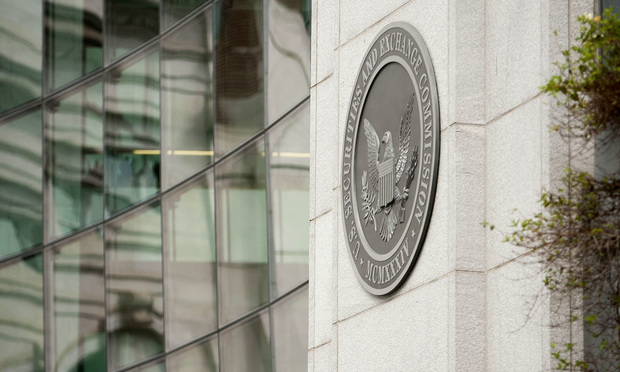 SEC headquarters inWashington. Credit: Diego M. Radzinschi
SEC headquarters inWashington. Credit: Diego M. Radzinschi
The U.S. Supreme Court on Wednesday narrowed the scope ofwhistleblower protection under the Dodd-FrankAct, ruling unanimously that employees must first report allegedsecurities violations to the U.S. Securities and ExchangeCommission.
|The decision in Digital Realty v. Somers stated thatsimply complaining of wrongdoing within the employee'scompany does not trigger the protections of the law, therebyinsulating securities firms from at least some whistleblowerlawsuits.
|Adhering to the language of the Dodd-Frank law, Justice RuthBader Ginsburg, writing for the court, said, “To sue underDodd-Frank's anti-retaliation provision, a person must first'provid[e]' … information relating to a violation of the securitieslaws to the commission.”
|During arguments Nov. 28, most justices wereskeptical that a broader interpretation was possible because of thewording of the statute.
|“How much clearer could [Congress] possibly have been?” askedJustice Neil Gorsuch, emphasizing the reporting requirement “to thecommission.”
|Daniel Geyser of the Dallas firm Stris & Maher, counsel towhistleblower Paul Somers, argued Dodd-Frank should be read incontext with the Sarbanes-Oxley Act of 2002.
|“The entire point that Congress had made in this statute[Dodd-Frank], and consistent again with every piece of modern,major whistleblowing legislation is to protect internalwhistleblowing,” he told the justices. “This is the ordinaryprogression of getting information to the government. You firstgive the corporation a chance for self-governance. If they refuseto do it, then you go to the government.”
|The U.S. solicitor general's office also argued that a narrowinterpretation of whistleblower protections would fail to protectcertain employees, including attorneys, who are required in someinstances to first report misconduct internally.
|“Our reading shields employees in these circumstances, however,as soon as they also provide relevant information to thecommission,” Ginsburg wrote. “True, such employees will remainineligible for Dodd-Frank's protection until they tell the SEC, butthis result is consistent with Congress' aim to encourage SECdisclosures.”
|The decision is a win for Kannon Shanmugam, a partner atWilliams & Connolly who argued the case for Digital Realty. Bycoincidence, Shanmugam was in the courtroom Wednesday morningto argue another case, Dahda v. United States.
|Two federal appeals courts reached opposite conclusions: theFifth Circuit said tipsters must first to go the SEC, and a dividedSecond Circuit found protections for those employees who firstreported misconduct to company officials. The ruling Wednesdayoverturned a Ninth Circuit decision.
|Leaders of the SEC's whistleblower program havequestioned thewisdom of the industry's challenge.Jane Norberg, chief of the SEC's whistleblower office, said lastyear that the agency's broad view of whistleblower protectionsshould be favored by companies for making corporate insiders morecomfortable reporting misconduct internally.
|Jason Zuckerman, a whistleblower lawyer in Washington, saidWednesday's ruling could drive corporate insiders who mightotherwise report internally to go more quickly to the SEC.
|“No doubt this is actually a very big loss for corporateAmerica. They won on this issue, but if you look at the bigpicture, this is a huge loss,” he said. “It is in the interest oflarge corporations to get employees to blow the whistle early,perform an investigation into the problem and halt it. As a resultof this opinion, employees are likely to blow the whistle directlyto the SEC because of the huge risk of reprisal and, because of theDodd-Frank Act, there is a significant financial incentive to blowthe whistle.”
|C. Ryan Barber contributed reporting from Washington. Thisreport was updated with comment about the Supreme Courtruling.
Complete your profile to continue reading and get FREE access to BenefitsPRO, part of your ALM digital membership.
Your access to unlimited BenefitsPRO content isn’t changing.
Once you are an ALM digital member, you’ll receive:
- Critical BenefitsPRO information including cutting edge post-reform success strategies, access to educational webcasts and videos, resources from industry leaders, and informative Newsletters.
- Exclusive discounts on ALM, BenefitsPRO magazine and BenefitsPRO.com events
- Access to other award-winning ALM websites including ThinkAdvisor.com and Law.com
Already have an account? Sign In
© 2024 ALM Global, LLC, All Rights Reserved. Request academic re-use from www.copyright.com. All other uses, submit a request to [email protected]. For more information visit Asset & Logo Licensing.








